

Design:Teaching Strategies. By assuming the role of a "facilitator/guide on the side" rather than "the sage on the stage", the instructor allows students to be more in control of their learning experience and more active in this process.
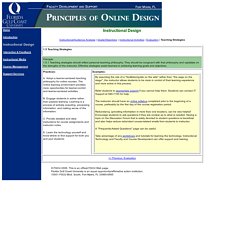
Refer students to appropriate support if you cannot help them. Students can contact IT Support at 590-7100 for help. The instructor should have an online syllabus completed prior to the beginning of a course, preferably by the first day of the course registration period. Redundancy, (providing information in more than one location), can be very helpful! Encourage students to ask questions if they are unclear as to what is needed. A "Frequently-Asked Questions" page can be useful. Authentic Assessment Toolbox Home Page. To the Authentic Assessment Toolbox, a how-to text on creating authentic tasks, rubrics, and standards for measuring and improving student learning.
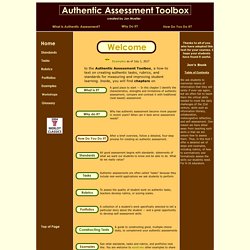
Inside, you will find chapters on A good place to start -- In this chapter I identify the characteristics, strengths and limitations of authentic assessment; compare and contrast it with traditional (test-based) assessment. Why has authentic assessment become more popular in recent years? When can it best serve assessment needs? After a brief overview, follow a detailed, four-step process for creating an authentic assessment. All good assessment begins with standards: statements of what we want our students to know and be able to do. Community Of Inquiry Framework. How to Use Social Media as a Learning Tool in the Classroom. Social media is an ingrained part of today’s society.
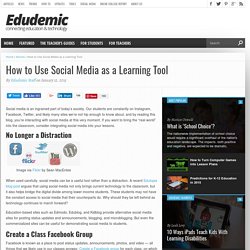
Our students are constantly on Instagram, Facebook, Twitter, and likely many sites we’re not hip enough to know about, and by reading this blog, you’re interacting with social media at this very moment. If you want to bring the “real world” into the classroom, consider integrating social media into your lessons. No Longer a Distraction Image via Flickr by Sean MacEntee When used carefully, social media can be a useful tool rather than a distraction.
Education-based sites such as Edmodo, Edublog, and Kidblog provide alternative social media sites for posting status updates and announcements, blogging, and microblogging. Create a Class Facebook Group Facebook is known as a place to post status updates, announcements, photos, and video — all things that we likely use in our classes anyway. A Facebook group also creates a space for students to ask and answer questions. The Power of Critical Theory for Adult Learning and Teaching : Stephen Brookfield : 9780335211333. Author information Stephen D.
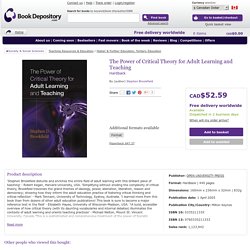
Brookfield is currently Distinguished Professor at the University of St. Thomas in Minneapolis-St. Paul, Minnesota. Adult Teaching and Learning: Developing Your Practice : Sue Cross : 9780335234660. Characteristics of Adult Learners. Extended Education - Continuing Education - Certificate in Adult and Continuing Education (CACE) Western Canada's premier program for adult educators and trainers since 1990.
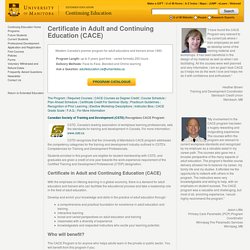
The Program | Required Courses | CACE Courses as Degree Credit | Course Schedule | Plan-Ahead Schedule | Certificate Credit For Seminar Study | Practicum Guidelines | Recognition of Prior Learning | Elective Workshop Descriptions | Instructor Bios | CACE Grade Scale | F.A.Q. | For More Information Canadian Society of Training and Development (CSTD) Recognizes CACE Program CSTD, Canada's leading association of workplace learning professionals, sets the standards for training and development in Canada. For more information: www.cstd.ca.
Extended Education - Continuing Education - Certificate in Adult and Continuing Education (CACE) Facilitating Adult Learning Experiences (Graduate) PRST%205470.pdf. Cace_11_x02.pdf. Cacehandbook.pdf. Adult Education Certificate. Certificate in Adult & Continuing Education (CACE) The Certificate in Adult and Continuing Education (CACE) program offered by the Centre for Continuting & Distance Education (CCDE), University of Saskatchewan, is being phased out and is no longer accepting new admissions.
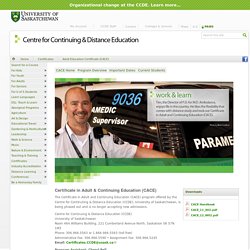
Centre for Continuing & Distance Education (CCDE) University of Saskatchewan Room 464 Williams Building, 221 Cumberland Avenue North, Saskatoon SK S7N 1M3Phone: 306.966.5563 or 1.866.966.5563 (toll free)Administrative Fax: 306.966.5590 • Assignment Fax: 306.966.5245Email: Certificates.CCDE@usask.ca (link sends e-mail) Program Assistant: Cheryl Bell Centre for Continuing & Distance Education, University of Saskatchewan 444 Williams Bldg, 221 Cumberland Ave N. Saskatoon, Saskatchewan S7N 1M3 Phone: 306.966.5562 FAX: 306.966.5590Email: Cheryl.Bell@usask.ca (link sends e-mail)
Certificate in Adult Education - College of Continuing Education. The Certificate in Adult Education is a comprehensive introduction to the field for those who wish to gain expertise, along with a recognized professional credential, in adult/continuing education.
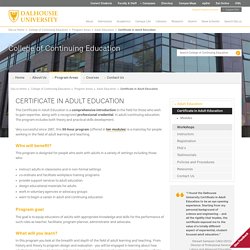
The program includes both theory and practical skills development. University of Calgary Continuing Education. Certificate in Adult Education. The Certificate program is designed to accommodate those who wish to take only the five adult education courses, and who may have no need or desire to pursue the BEd degree.
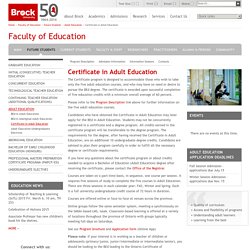
The certificate is awarded upon successful completion of five education credits with a minimum overall average of 60 percent. Please refer to the Program Description link above for further information on the five adult education courses. Program Description. Prospective students should apply to the appropriate program based on the following program entry criteria: Program A (subsequent degree) for those who have successfully completed an undergraduate degree (minimum three-year).
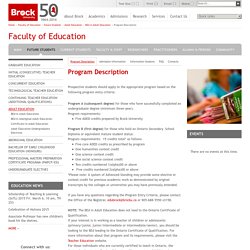
Program B (first degree) for those who hold an Ontario Secondary School Diploma or equivalent mature student status: *Please note: A system of Advanced Standing may provide some elective or context credit for previous academic work as demonstrated by original transcripts by the colleges or universities you may have previously attended. Core CoursesAll core courses must be completed for degree requirements in the prerequisite sequence. Certificate in Adult & Continuing Education. Description Join the CACE LinkedIn Group!
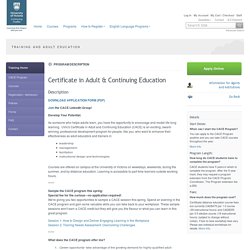
Develop Your Potential. As someone who helps adults learn, you have the opportunity to encourage and model life-long learning. UVic's Certificate in Adult and Continuing Education (CACE) is an exciting, award-winning, professional development program for people, like you, who want to enhance their effectiveness as adult educators and trainers in: leadershipmanagementfacilitationinstructional design and technologies Courses are offered on campus at the University of Victoria on weekdays, weekends, during the summer, and by distance education. Sample the CACE program this spring:Special fee for the curious—no application required! Adult Learning and Education - Master of Education - Postgraduate / Graduate Degree Program - UBC Grad School. General Information The mission of the Adult Learning and Education graduate program at UBC is to contribute to the creation, elaboration, exchange and application of knowledge concerning the education and learning of adults wherever they occur.
This includes the development of scholars and reflective practitioners who will shape society and its institutions in ways that promote lifelong education and learning for all. Quick Facts Master of Education. Department of Educational Studies. Questions and Answers What’s the difference between an MA and an MEd program? The MA is designed for students interested in learning more about conducting research and going on to a PhD. The core courses for MA students wanting to specialize in adult education are the same as the core courses for MEd ALE students. MA students must take other required MA courses, find a committee, prepare a research proposal and conduct their research and write up the results and defend their thesis, so the program tends to take longer than the MEd. The MEd program is for those students whose primary interest is in developing or further developing their professional practice.
Can I transfer credits? UBC policy allows a transfer of up to 12 credits to a graduate program under certain conditions: Please check the Faculty of Graduate Studies policy on this www.grad.ubc.ca/faculty-staff/policies-procedures/transfer-credit Are the courses available online? Adult Learning and Education - Master of Education - Postgraduate / Graduate Degree Program - UBC Grad School. Master of Arts in Education/Adult Education and Training. The Master of Arts/Adult Education and Training (MAED/AET) program is designed for individuals interested in working with adult learners in areas such as corporate training, non-profit and community-based organizations, government, postsecondary education, and human services agencies. Learners develop competencies and expertise necessary to align education and training with strategic objectives and human services foundations across an enterprise with culturally diverse populations. Learners expand their knowledge in andragogical theory, instructional design and strategies, assessment of learning, delivering online learning, management and marketing, and technology integration.
In addition, learners engage in practice through collaborative learning, social media, and community-based learning. Graduates will be able to serve adult students, colleagues, industries, and communities as expert educators and trainers. Online Master's Degree in Adult Education and Training - CSU Online Plus. Hear program chair Karen Kaminski describe the distinct ways this online master’s in adult education and training sets you up to be a successful student, and in turn, a successful adult educator. Learning is a lifelong endeavor and trained specialists are needed to teach adult learners in postsecondary, community, and corporate settings.
University of Calgary Continuing Education. Certificate in Education (Education and Training) / Post-Graduate Certificate in Education (Education and Training) Validated by the University of Central Lancashire (UCLAN) in partnership with St Helens College These qualifications are suitable for those wishing to pursue a career in teaching or those already employed as teachers.
These qualifications enable you to teach within the post-age 16 sector which includes; further education colleges, sixth form centres, and private training organisations. When will I start the course and how long will it take? The course will start in September and will be completed two academic years later in the spring/summer. The college day of attendance will be Tuesday from 9am to 4pm. Adult_Education_Toolkit.pdf. Teaching Adults Certificate ~ ONLINE! Teaching Adults Certificate ~ ONLINE!